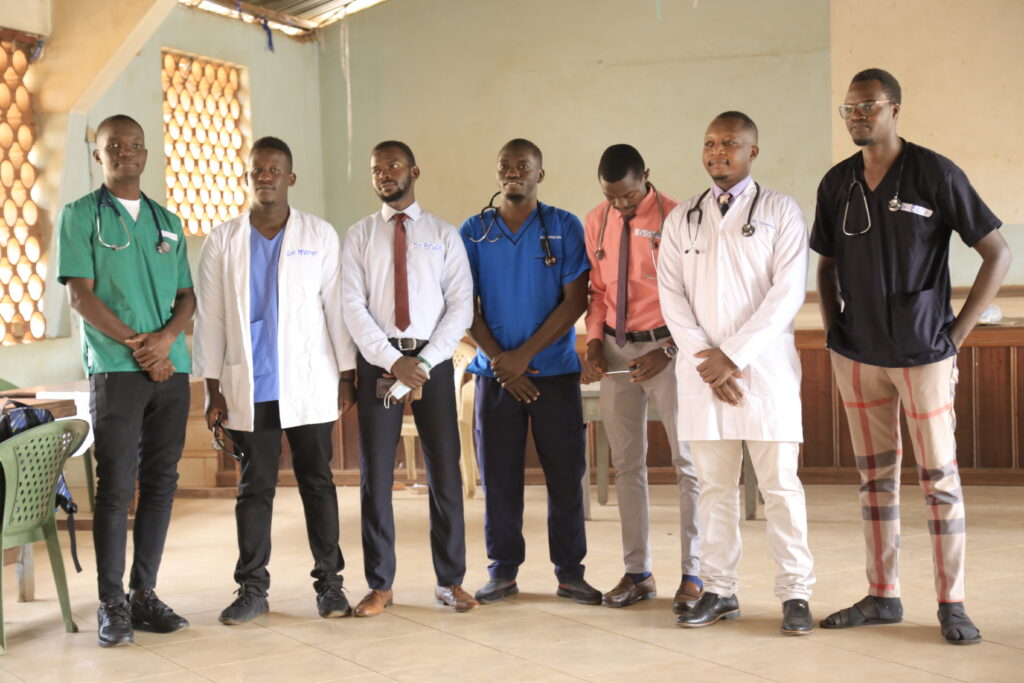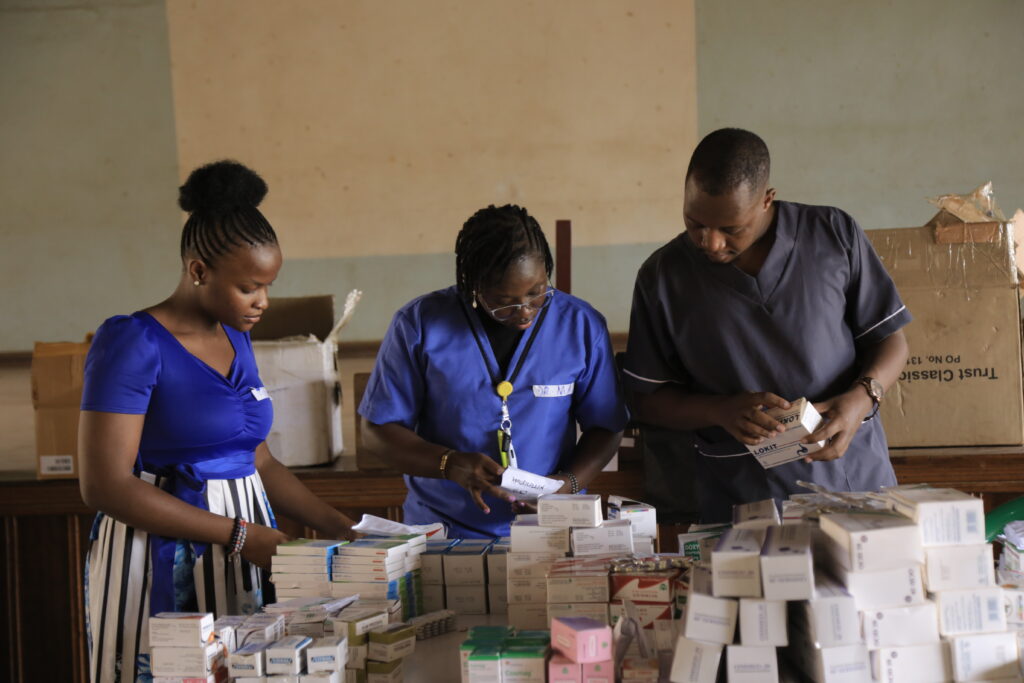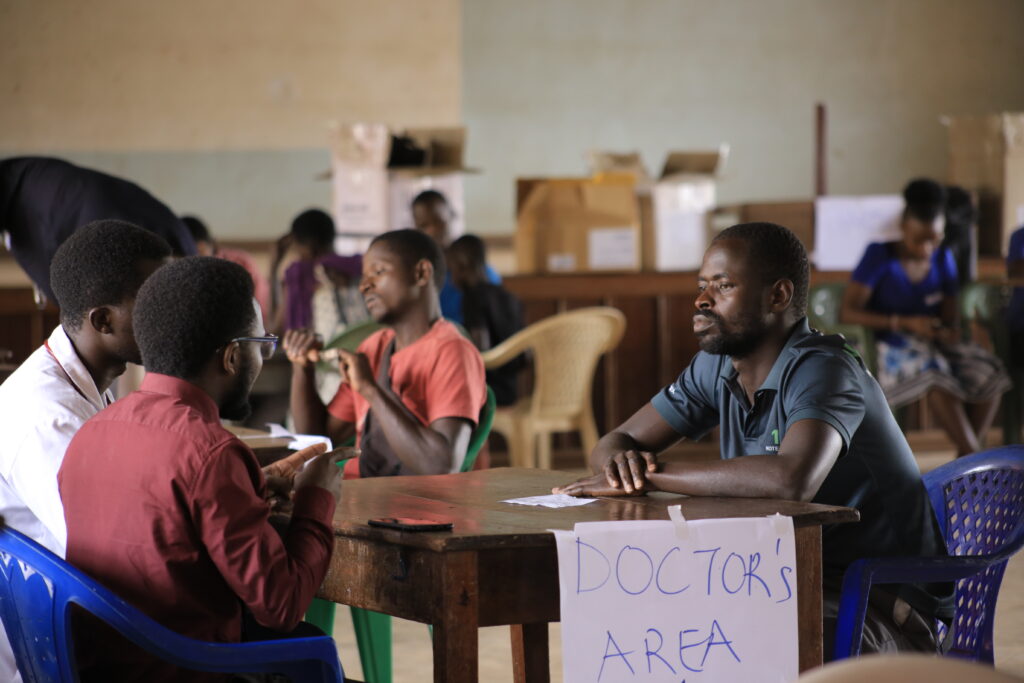'It Is The Best We can Do':
Young Ugandan Health workers take Medicare to Underserved Communities
Written by: Dan Ayebare. Filmed by Richard Mugambe
Written by: Dan Ayebare. Filmed by Richard Mugambe
It is the third industrial medical practice stint for Jemba Michael Senkole, a young and upcoming medic in Uganda.
He has been to different medical facilities with different terrains and different people, but one thing remains constant.
From Ishaka to Mbarara and now Mubende, in Central Uganda, even from Senkole’s rookie lens, he can tell most of the cases he is treating are preventable.
“They would come when it is already worse. I also thought we would better give knowledge than just focus on treatment. We realized we needed to just go to communities and tell people, ‘do this’, ‘eat this’, and cases would then reduce,” Senkole recollects.
Senkole has since mobilized and put together an army of young medical professionals who occasionally leave the comfort of their affluent workstations to spend time treating patients in the most underserved communities of Uganda.

Medical graduates take a group photo ahead of a deaf community outreach in Kampala. Photo by Moses Sserunjogi
A story is told of a hummingbird, a relatively tiny creature, wherein it fetches drops of water using its small beak to help put out a wild forest fire.
The other animals of better abilities (who previously shared the same habitat) while stuck on the edge of the forest laugh at her, but the bird replies, “I’m doing what I can”.
The efforts of these medical professional are akin to the very hummingbird whose name their umbrella organization adopted. With no funding or government support, they are attempting to ‘put out a fire’. A fire of widespread gaps in a highly ineffective national health service.
“We first came together as a group of young Medicine and Surgery classmates at Kampala International University Medical School who just wanted to contribute to health access and equity in our country,” says Dr Elvis Nakibinge, a medical consultant who has been part of the outreach team since inception.
The group offers free expertise and reaches out to their wide networks to fundraise for medical supplies and other logistical expenses like transport and accommodation. They then set out dates, normally on weekends when they visit areas, ‘where the nearest health facility is more than 15kms away on average’.
“People are suffering with simple health challenges. They live with them for long periods, until they worsen into complex matters,” adds Dr Senkole. Though their outreaches are periodical, their only hope is that they ‘can put out as much fire as they can’.
In addition to the treatment, they work in tandem with the nearest health facility to ensure more complex health cases can be taken care of too.
“ We can’t do a lot. Cases that require surgery and other complex procedures are referred to other facilities, with whom we reach out and forge a relationship on arrival,” explains Senkole.

Health workers prepare mobilized medicines for medical outreach. Photo by Moses Sserunjogi.
Seven years later, after being part of countless treatment camps for underserved communities in Uganda, Senkole and his classroom colleagues realized yet another concerning pattern. They had never seen a deaf person show up at the camps.
“So, don’t the deaf ever get sick or unwell?” he wondered.
Senkole, together with his Hummingbird Foundation, which comprises 212 volunteers, the majority of whom are medics had been to several Ugandan districts like Agago, Bushenyi, and Kamuli before they chose to shuffle up the pack at least once.
In October 2023, they partnered with The Whole Nation Foundation for the Deaf to organize an outreach exclusively for the deaf, at St Matia Mulumba Catholic parish, near the capital Kampala, especially to benefit those residing in the city and it registered instant success.
It is unusual that these outreaches are carried out in urban areas which are relatively well covered with health services, but Senkole says it was just a pilot. They are on a mission to reach as many deaf people as possible, across the divide.
In a two-day camp, they sensitized over 50 deaf people on common ailments, personal hygiene, sanitation, and healthy living, before embarking on a treatment program on the second day.

A man with hearing impairment consults doctors through an interpreter during a medical outreach. Photo by Moses Sserunjogi.
Despite the deaf community comprising about 3% of Uganda’s population, the country’s healthcare facilities still lack the crucial support of sign language translators with most of them charging 100,000 UGX (25 dollars) per hour. This is compounded by the country’s appalling 1:25,000 doctor-to-patient ratio.
“If a deaf person goes to a public hospital, they often struggle to communicate effectively. At the time, the doctor may have a thousand others to attend to. It is unfortunately easy for the deaf person to be shoved aside,” Senkole explains.
Stella Nanyanzi, a counselor at Mulago School of the Deaf revealed to Solutions Now Africa that she and some deaf colleagues have had to hire an interpreter to escort them to the hospital where they are to consult a hearing doctor.
“Just imagine you are paying a person to explain your sickness to a hearing doctor,” she vividly paints the picture.
According to the World Bank, about 40% of total Ugandan healthcare expenditures are out-of-pocket, and modeled data suggests nearly 80% of the population is at risk of catastrophic or impoverishing health expenditures.
Though Uganda is mooting a universal health insurance scheme, it presents compelling evidence of the need for a “new social contract” between the state and its citizens.
Presently, Community-based health insurance schemes and Private Health Insurance cover only 7.5% of the population of Uganda.
© 2022 - Media Challenge Initiative | All Rights Reserved .
© 2022 - Media Challenge Initiative | All Rights Reserved .